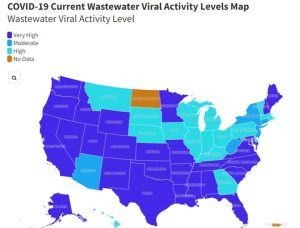Florida July COVID cases surge more than double last year; new tests, vaccines coming soon
Florida Today | By C. A. Bridges | August 27, 2024
New vaccines approved, free COVID tests coming again in September
COVID cases are surging in Florida over last year’s summer totals, as schools have started classes.
Last week, the U.S. Food & Drug Administration approved new COVID-19 vaccines from Pfizer and Moderna for people aged 6 months and older as cases of new variants surge across the country. Shots are expected to arrive at distribution sites, CVS and Walgreens locations within the next few days.
The vaccines will target the JN.1 lineage, including the subvariant KP.2.
U.S. health officials announced Friday that free COVID test kits will be available again from COVIDtest.gov during the fall and winter months, starting in late September. Americans can order up to four tests per household to be sent directly to their homes.
The tests will be able to detect the dominant JN.1 variants — KP.3.1.1 and KP.3 — that are currently circulating, according to Dawn O’Connell, assistant secretary for preparedness and response at the U.S. Department of Health and Human Services.
COVID-19 cases, hospitalizations and deaths have been rising in recent weeks, according to the Centers for Disease Control and Prevention.
As of Aug. 16, the CDC estimated that COVID infections were growing or likely growing in 27 states.
Florida COVID cases more than double from last year
According to data from the Florida Department of Health, the Sunshine State is seeing a massive surge in cases, more than double, compared to last year. There were 94,221 cases in July compared to last year’s 46,524. June was also slightly higher year-over-year, with 38,159 cases compared to 28,408.
That’s a noticeable jump since the number of cases in every other month this year was down compared to 2023, especially since there are almost certainly more cases that never get reported. The FDOH has not issued a press release concerning COVID since January, when State Attorney General Joseph Ladapo sent a letter to the FDA calling for a halt to mRNA vaccines.
COVID-related deaths continue to be down, with 164 counted in July versus 523 in July 2023. So far 3,599 deaths have been reported in Florida in 2024, 95,565 since the pandemic began in 2020.
Can Florida schools or businesses require COVID vaccines?
Not really.
Educational institutions may require COVID-19 vaccines if:
- They have not been authorized by the FDA as emergency use authorization vaccines
- They also allow for religious exemptions, which require no proof
- They allow for medical accommodations for persons who decline or cannot receive the routine vaccines.
Public and private employers are “prohibited from discriminating against employees, contractors, volunteers, and visitors without opportunity for these individuals to obtain an exemption based on religious beliefs or medical necessity,” according to the FDOH.
The state was unable to block federal requirements for healthcare workers.
COVID-19 Current Wastewater Viral Activity Levels Map
Testing does not capture all cases, especially when people test at home and don’t report it. Another way to track the spread of COVID-19 is to test wastewater. By that measure, the viral loads are “very high” in 32 states and the District of Colombia, the CDC said, including Florida.

CDC recommends new COVID vaccines
“CDC recommends everyone ages 6 months and older receive an updated 2024-2025 COVID-19 vaccine,” the agency said in a release, “to protect against the potentially serious outcomes of COVID-19 this fall and winter whether or not they have ever previously been vaccinated with a COVID-19 vaccine.”
Vaccines are covered by most healthcare plans, Medicare and Medicaid. A federal program called the Bridge Access Program provided free COVID vaccines to 1.5 million adults without health insurance or with insurance that didn’t cover COVID vaccine costs, but that program ends Aug. 31.
Instead, the CDC will distribute $62 million of “unused vaccine contract money” to local and state health departments to provide updated vaccines to people who are uninsured and underinsured, an agency spokesperson said. But vaccine access for people without insurance may be very limited.






